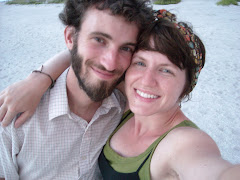Well, we wrote a few weeks ago that after a week in Port-au-Prince we would head to Desarmes to visit our new home. Well, as you have read or seen on the news, Hurricanes Gustav and Hanna hit Haiti. In PAP we didn't get much more than rain and some strong winds, not much to write about, but everywhere else got hit really hard, especially the low-lying areas north of us (Gonaives and St. Mark). Enough rain fell that both cities were totally flooded, and on top of this a dam in the mountains close to the Dominican Republic had to open up because it could no longer hold the rainwater. Needless to say, all of this water destroyed a lot of the Artibonite River Valley crops, which include: rice, bananas, plantains, corn and thousands of families' subsistence gardens. To make matters even worse, bridges have been destroyed so vehicles cannot get into these areas.
What does this mean for us? We cannot get to Desarmes yet, and for now we need to wait in PAP until the bridges are rebuilt and roads are passable again.
I've was expecting Desarmes to be different from PAP. Now with most gardens destroyed, it will certainly add to the severity of any problem that previously existed. But, as our Creole teacher just pointed out to me, Haiti is a place where the possible can be impossible--but the impossible is always possible.
Monday, September 8, 2008
Subscribe to:
Post Comments (Atom)


4 comments:
“Haiti is a place where the possible can be impossible--but the impossible is always possible.” Is this an optimistic statement? It always confuses me when people make these types of statements.
Yes, this is intended to be a positive statement, though a reminder that it can be frustrating for N. Americans because the "simple" or possible things can sometimes be very frustrating to accomplish.
The best example I can think of is that nobody would have expected a slave colony in the Caribbean to become an independent country, and it did.
Most people see no hope for Haiti. This helps remind us that anything can happen and people can move forward despite all the problems.
It will be interesting to see if the reforestation work done so far by MCC has had any appreciable effect in protecting the area from mudslides, erosion, crop loss, etc. One of the unlooked for blessings from natural disasters like hurricanes may just be giving people more of a sense that this ecological sustainability work is not a luxury but rather is the most effective way to guarentee safety and prosperity of Haitians (among other benefits).
Yes, although I think a challenge will be to drive that point home with people who can have more impact on ecological sustainability work in general. It's too easy for a little country like Haiti to feel far removed from a place like the U.S. where the general public has a lot more impact on the environment in their daily lives than a lot of other people around the world.
Post a Comment